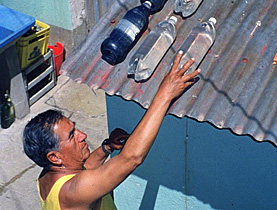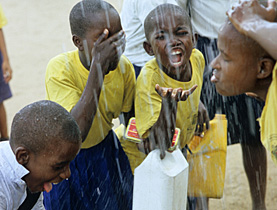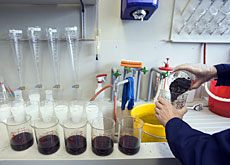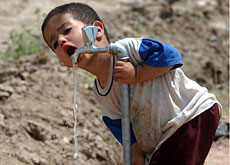Study questions benefits of clean water project

A Swiss project in Bolivia to create clean drinking water using plastic bottles and sunlight is ineffective, according to the Swiss Tropical Institute.
But an organisation promoting the method says too much is at stake to write the project off, adding that greater education is needed to convince local communities that such a simple system actually works.
In theory, exposing clear PET bottles full of water to natural ultraviolet light to kill pathogens could save hundreds of thousands of lives in poor, disease-ridden countries. In practice however the rate of illnesses such as severe diarrhoea has not dropped, a study in Bolivia has found.
The World Health Organization (WHO) and numerous other studies have shown that leaving plastic water bottles in the sun is a simple, cost-effective way to kill germs that cause diarrhoea, cholera and other water-borne illnesses.
For the past ten years, workers at the Federal Institute for Environmental Science and Technology (Eawag) have promoted the method in 30 developing countries where three million people are exposed to heavily contaminated water. Scientists have known about the purification method, called solar water disinfection, or Sodis, for more than 20 years.
But a health-impact study conducted by the Basel-based Swiss Tropical Institute and the University of California-Berkeley released this week found that the rate of illnesses such as severe diarrhoea have not dropped in Bolivia, where seven test communities and four control groups have been trying the system for a year.
The study concludes that health officials should hold off on promoting the method until more research can be done to find out why the system works in the lab but not in practice.
User error
That would be the wrong thing to do, authorities at the Sodis Reference Centre said. That group, a branch of Eawag, works to create clean drinking water for some of the 1.1 billion people around the globe lacking it.
The problem was not with the effectiveness of the purification process but in teaching poor, uneducated people that such a simple method actually works, they said.
“It is often difficult to promote in developing countries because people living in villages and urban slums doubt that simply exposing bottles to the sun will provide them with safe drinking water,” Regula Meierhofer, head of the Sodis Reference Centre wrote in a report.
The group notes that studies conducted in Kenya found that communities that used the method suffered nearly 25 per cent fewer cases of severe diarrhoea.
The battle against cholera proved even more effective, especially among children. The study showed that children under six had 88 per cent fewer cases of the disease during an epidemic in the region.
Other studies in Bolivia, the western hemisphere’s poorest country after Haiti, have shown that diarrhoea cases dropped 40 per cent among communities that used sunlight to purify water.
Changing habits
For its own study, researchers from the Tropical Institute looked at 700 children in the test and control groups scattered across Bolivia’s high and barren Altiplano, a desperately poor region of mostly indigenous people.
They found that children in the test communities on average suffered from diarrhoea 3.6 times a year, compared with 4.3 times for children in the control groups over the same period.
“The gap isn’t statistically viable because the difference observed between the two groups could also be a coincidence,” the report stated.
Eawag countered those findings by saying the study was not representative. Researchers did not accurately distinguish between people who drink only sun-purified water and those who still consume some dirty water.
Eawag estimated only 14 per cent of people at most in the project area used the method correctly.
The group said careful and comprehensive training is needed to take into account cultural contexts and local habits, which often made it very difficult for households to suddenly change the way they’ve managed their lives for generations.
“Often people are reluctant to change their current behaviour and adopt new hygiene practices, such as hand-washing,” Meierhofer concluded. That said, too much is at stake to kill the project.
“Every day about 4,500 children die of dehydration due to diarrhoea. It would be wrong to stop the promotion of Sodis in developing countries based on the Bolivia study. There are too many successful implementations in other countries.”
swissinfo.ch
Nearly 1.1 billion people lack access to safe drinking water, according to WaterAid.
A WHO/Unicef study says that lack kills almost 4,500 children per day. Of the 4 billion cases of diarrhoea per year, 2.5 million people die. That is the equivalent of 20 jumbo jets crashing every day.
This problem isn’t confined to a particular region of the world. A third of the Earth’s population lives in “water stressed” countries and that number is expected to rise dramatically over the next two decades, especially in Sub-Saharan Africa and South Asia.
For the Sodis method to work, a clear plastic bottle must be left in direct sunlight for 6 hours. The sun’s UV-A radiation renders any harmful microbes inert. Under cloudy skies, the bottles should be left outside for two full days.
In 1991 the Swiss Federal Institute of Aquatic Science and Technology (Eawag) and the Department of Water and Sanitation in Developing Countries (Sandec) conducted laboratory and field tests to develop and test the Solar Water Disinfection Process (Sodis).
The Sodis Reference Centre works to provide information, technical support and advice to locals in developing countries to promote the low-cost way of bringing safe water to poor communities.
The Swiss Tropical Institute is not an oxymoron but a federal group also supported by canton Basel-City that strives to improve health at home and around the globe through research, services, teaching and training.
The agency consists of five departments that deal with everything from parasites and infections to pharmaceuticals and vaccination services.
The group is associated with Basel University and emphasises an interdisciplinary approach to combine field, laboratory and clinical work.

In compliance with the JTI standards
More: SWI swissinfo.ch certified by the Journalism Trust Initiative



You can find an overview of ongoing debates with our journalists here . Please join us!
If you want to start a conversation about a topic raised in this article or want to report factual errors, email us at english@swissinfo.ch.